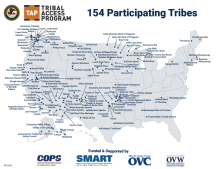Overview
Tribes face unique challenges in information sharing and accessing federal databases, which impact law enforcement and public safety not only in Indian Country but across the United States. Tribes implementing SORNA are required to submit sex offender biometrics and biographical data into various federal databases, including the National Sex Offender Registry (NSOR). To help facilitate this, the U.S. Department of Justice (DOJ) launched the Tribal Access Program for National Crime Information (TAP) in August 2015 — fully funded initially by the SMART Office — to provide tribes access to national crime information systems for both criminal and civil purposes.
TAP allows tribes to exchange critical data across the DOJ’s Criminal Justice Information Services (CJIS) systems and other national crime information systems. TAP enhances participating tribes’ ability to register sex offenders, have orders of protection enforced off-reservation, protect children, keep guns out of the wrong hands, improve the safety of public housing, and allows tribes to have tribal arrests and convictions be associated with their tribe.
Tribal criminal justice agencies eligible to use TAP include police departments, prosecutors, criminal courts, jails and probation departments. The civil agencies and programs eligible to use TAP include sex offender registration programs; agencies whose staff have contact with or control over Indian children; public housing agencies; child support enforcement agencies; Head Start programs; civil agencies that investigate allegations of abuse, neglect and exploitation of children; and civil courts that issue orders of protection, injunctions, restraining orders or other keep away orders.
See which tribes are participating in TAP here.
Functions
DOJ Serves as the CJIS Systems Agency For Federally Recognized Tribes
DOJ grants network access to tribes, modeled on federal agencies’ access.
DOJ handles personnel, IT and physical security; vetting and on-boarding; testing; training; and auditing.
DOJ Provides Enhanced Training and Assistance
TAP provides online and onsite training, helps tribes to analyze needs, and identifies and provides appropriate solutions to help tribes access and utilize national crime information.
National Crime Information Systems
National Crime Information Center (NCIC)
A criminal records database, allows criminal justice agencies to enter or search for information about stolen property, missing or wanted persons, and domestic violence protection orders; to obtain criminal histories; and to access the National Sex Offender Registry.
Next Generation Identification (NGI)
A database of palm and fingerprints and mugshots, allows identity verification, arrest information submission, and access to fingerprint-based criminal histories. Formerly known as the Integrated Automated Fingerprint Identification System (IAFIS).
National Data Exchange (N-DEx)
A national investigative information-sharing system, gives access to records from across the nation to aid in criminal investigations. Investigators can review criminal justice data from state, local, tribal, regional, and federal agencies, 24/7, from any secure internet-connected device. Data includes incident reports, arrest reports, booking and incarceration reports, pre-trial investigations, and probation and parole records.
National Instant Criminal Background Check System (NICS)
A system used by Federal Firearms Licensees to determine a person’s eligibility to buy firearms or explosives, helping to prevent prohibited persons from purchasing firearms or explosives; to issue firearms-related permits; and to manage seized firearms.
Law Enforcement Enterprise Portal (LEEP)
A gateway for criminal justice agencies to access unclassified law enforcement intelligence products, as well as systems and services such as N-DEx, Intelink, the Regional Information Sharing Systems Network (RISSNET), National Gang Intelligence Center, eGuardian, Virtual Command Center and others.
International Justice and Public Safety Network (Nlets)
An interstate justice and public safety network owned by the states, supports inquiries to state systems for criminal history, driver’s license, and motor vehicle registration, and federal systems, such as the Department of Homeland Security U.S. Immigration and Customs Enforcement Law Enforcement Support Center, the Drug Enforcement Administration National Drug Pointer Index (NDPIX), the Federal Aviation Administration Aircraft Registry, and the Canadian Police Information Centre (CPIC).
TAP History
In 2015, DOJ selected tribes to participate in the initial User Feedback Phase. Funded entirely by the SMART Office, this phase focused on testing DOJ’s technology solution and training support, and gave tribes access to databases needed to implement SORNA; it also enabled tribes to identify and share best practices to use national crime information databases to strengthen public safety.
In 2016, nine tribes received a kiosk workstation that provided access to national systems and training to support whole-of-government needs, implementing TAP in a variety of criminal and civil agencies.
DOJ has expanded the program every year since, to include over 100 tribes located in more than 25 states. By the end of 2021, 108 tribes were participating in TAP.
The SMART Office continues to serve as a key funder each year and works closely with DOJ’s Office of the Chief Information Officer's technical assistance team to provide subject matter expertise on using TAP services to complement and enhance tribal sex offender registration programs.
Requirements for TAP Participation
To participate in TAP, tribes agree to comply with and adhere to auditing and policy requirements, personnel and physical requirements, and technical security requirements applied to all agencies when accessing national crime information systems. Tribes designate a coordinator/security officer who ensures all personnel with access adhere to all training and policy requirements. Tribes also agree to be audited by DOJ following Department policy.
Tribes must provide high-speed internet access and pay any FBI CJIS user fees associated with fingerprint- and name-based checks for noncriminal justice purposes, executing a user fee memorandum of understanding with CJIS to pay those fees. Additionally, tribal governments must make legislative or policy determinations that provide guidance to tribal courts and law enforcement on what tribal data to share.
If a tribe has access to CJIS systems through state CJA networks, DOJ encourages the tribe to include the state CSA in any discussions about its information needs.
Learn More
To learn more about the Tribal Access Program and how TAP is providing access to national crime information read this 2016 presentation or visit the DOJ TAP webpage.
Watch the TAP workstation training video for tribal sex offender registration personnel.
Contact the TAP team at [email protected]



